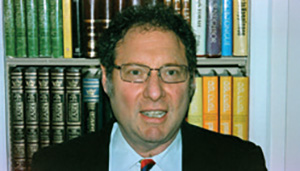
Do you know why we are here? Why do we go to shul? The answer should be obvious—to pray to God. But why is there so much talking in shul? Why do so many men come to shul late, some very late? Why do we sit with our friends?
Sometimes prayer is difficult. It can become routine, mechanical, almost boring. We may be so busy speed reading the words, or we may not understand all the Hebrew, or maybe we are not concentrating on what we are saying. Has prayer lost its meaning?
Some of us have never developed a feeling for prayer because we have never developed a true belief in God, what He does for us, His guidance and supervision of our lives. We have never seen God. We have never heard God speak. We have never experienced God. Perhaps we have just been brought up in religious families and had a yeshiva education, but it simply never sank in.
Every once in a while, Reb Levi Yitzchak of Berditchev would dispatch his servant to one or the other synagogues: “Look neither to your right nor to your left, walk straight up to the bimah, pound your fist on the pulpit and make the following announcement: ‘Know ye, men and women, know that God exists and that He is of this world, of this world too!’”
Have some of us become too complacent about prayer, about the need to communicate to, and think about, God. Many of us are financially successful, healthy, satisfied with our lives, with what we have and have accomplished. We think that our health, our prosperity, that everything we have comes about by our own hard work.
The King of the universe is in shul at the start time of prayer, when a minyan of 10 men have gathered to pray. How is it possible to come to shul late? Would we come late to a meeting with our employer? If a king or president invited us to the palace or White House, would we come late?
Rav Joseph Soloveitchik taught that real prayer is derived from loneliness, helplessness and a sense of dependence. Out of this sense of discomfiture, prayer emerges. We should want to be alone with God. Then why do we sit next to our best friends, sometimes for camaraderie and socializing? The room is filled with the Shechinah, the Presence of God!
The Rav writes: “It is impossible to imagine prayer without at the time feeling the nearness and greatness of God, the Creator… We cling to Him as a living God, not as an idea, as an abstract Being. We are in His company and are certain of His sympathy. There is in prayer an experience of emotions that can only be produced by direct contact with God.”
Here is a different perspective to the same question of “Do you know why we are here?” You are here because God wants you to be here. God knew you before you were born. God knows you because He made you, and He made you because He needs you—or more precisely, because the world needs you. We are here because someone, the One, wanted you to be, and He has set you a task only you can do.
Each one of us is unconditionally valued. God values us unconditionally. You are here because He wanted you to be here. Our very existence testifies to His love.
The only question strong enough to endow existence with meaning is not “What do I need from life?” but “What does life need from me?” That is the question we hear when we truly pray.
More than an act of speaking, prayer is an act of listening—to what God wants from us, here, now. What we discover—if we are able to create that silence in the soul—is that we are not alone. With prayer, we emerge strengthened, transformed. More than prayer changes God, it changes us.
Once a man came to his rabbi, presenting him with a long list of his needs. The rabbi studied the petition and then remarked, “It seems you have given a great deal of thought to all that you need. Have you given equal thought as to why you are needed?”
This comment sent the man reeling. The rabbi had sharply reprimanded the man for indulging in what he would like to get out of life, but not giving adequate thought to what he must contribute to life. What was he to give to the world, and what measures had he taken to fulfill his obligation?
While the man trembled with the admonishment, he was also elated. He had been reminded that his life has a purpose. He had great value. There is something unique about him, some special mission he must complete. He trembled, but with joy.
By Martin Polack
Martin Polack is a business analyst and is involved in adult Jewish education.










